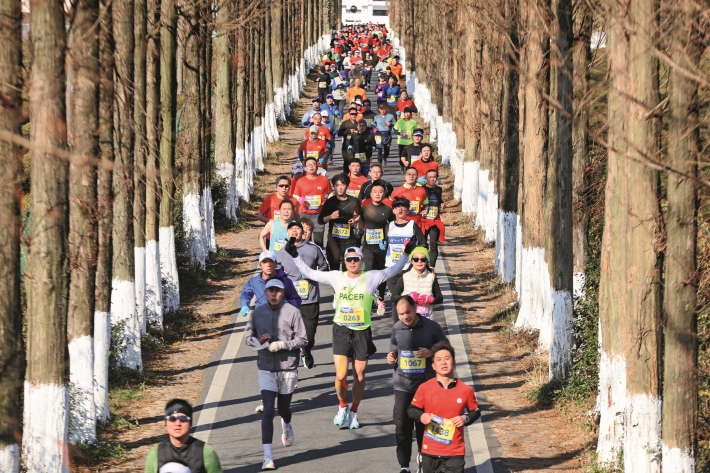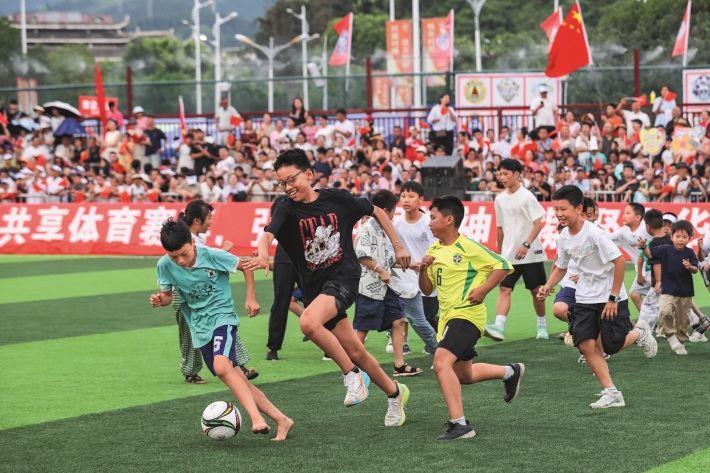|
||||||||||
| Home Top News Economy/Tech Culture/Sports China in Foreign Eyes Green Development Videos Intangible Cultural Heritages |
|
||||||||||
| Home Top News Economy/Tech Culture/Sports China in Foreign Eyes Green Development Videos Intangible Cultural Heritages |
| ChinAfrica |
| In Pursuit of Performance |
| Sporting events are revitalising local economy in Chinese counties |
| GE LIJUN | VOL. 17 September 2025 ·2025-09-01 |

Runners take part in a marathon in Deqing County, Huzhou, Zhejiang Province, on 29 December 2024 (XINHUA)
On a summer morning in Boqiang Village, tucked beneath the emerald mountains of Fanshi County, Shanxi Province, the Ultra Trail Mount Wutai 2025 commenced with the sound of the starting pistol - an event that was much more than just a competition. As soon as the colourful smoke bombs lit up the sky, some 2,000 runners from China and abroad set off to reach one of the country’s most sacred Buddhist peaks. Over the past decade, this race has become a fixture on the global running calendar and a symbol of the growing popularity of endurance sports.
But beyond athletic achievement, the event represents a much deeper change: the emergence of sport as a driver of economic development in Chinese counties. In Fanshi, the local authorities have made sport a strategic pillar. Around 10 events have been carefully planned for 2025, with a combination of trail running, basketball, road running, orienteering, badminton and table tennis. The county has created a vibrant sporting ecosystem that attracts athletes, spectators, casual visitors and consumers.
By using competitions to combine culture, tourism and gastronomy, these small Chinese counties are reinventing their local economies. Sport has become a powerful driver of consumption, linking a chain of economic sectors.

A foreign buyer shares a friendly moment with an exhibitor at a sports industry exhibition in Jinjiang, a county renowned for its sporting goods in Fujian Province, on 19 April (CNS)
Sport +: a versatile and immersive experience
As the concept of “travelling for sporting events” gains popularity in China, Fanshi has turned this trend into a real growth strategy. The traffic generated by the competitions has been transformed into a sustainable flow of tourists, boosting the economic returns.
During the competitions, hotels are fully booked, restaurants are full and local products see increased sales. This dynamic is based on an integrated approach that is termed “sport +.” At each competition, local agricultural fairs are organised to encourage direct exchanges between producers and visitors and stimulate local consumption.
Beyond the immediate benefits, Fanshi has created a comprehensive tourist experience. Ancient temples, thousand-year-old frescoes, culinary specialities … local heritage is integrated into visitors’ itineraries, prolonging their stay and promoting regular consumption. In this way, sport has become a catalyst for local appeal.
“I had been dreaming of making a pilgrimage to Wutai Mountain for a long time. This time, my friends from Beijing and I decided to take part in the ultra trail. It’s a different but equally amazing way to discover the landscapes of this sacred mountain,” Katalin Sogor, a Hungarian participant, told Shanxi Daily.
In the neighbouring county of Daixian, this strategy has been developed on an even larger scale. With more than 700 sporting events organised in a year, Daixian has established itself as a leading regional centre. Boxing, marathons, pétanque ... during these competitions, hotel demand soars, making it difficult to find a room. The economic dividend is immediate: hotels, restaurants and local businesses experience double-digit growth during the competitions. This is where sport proves to be a powerful enabler of economic resilience.
Daixian also follows the “sport +” model to increase its attractiveness. Under the “sport + tourism” promotion, the Yanmen Pass is free for participants, while accompanying persons receive discounts. Local industry is also integrated into this dynamic: Daizhou yellow wine, which is offered as a prize at the competitions, is becoming increasingly popular with young people and international visitors.

Children play during half-time of a match of the Village Super League in Rongjiang County, Guizhou Province, on 26 July (CNS)
A propeller for industrial growth
The sporting push does not stop at the racecourse or stadiums. In some counties, competitions have become the springboard for new industries. In Shangyou County, a small mountainous region in Jiangxi Province, pickleball, a hybrid of tennis, badminton and table tennis, has gained popularity locally.
In July last year, Shangyou hosted the first stage of the national pickleball championship in China. From 26 to 27 July this year, the county again welcomed a major round of the tour. The county has not limited itself to organising events; it has turned this sporting opportunity into an industrial engine by harnessing local expertise in fibreglass to build an integrated equipment manufacturing sector. From raw material to finished product, an entire ecosystem has been patiently developed.
Yilian illustrates this transformation. The company, which previously specialised in scooter helmets, has successfully shifted to making pickleball paddles. With an annual capacity exceeding 100,000 units, Yilian now benefits from a local supply chain comprising around 10 companies. It has become a symbol of successful industrial diversification, driven by public support, growing domestic and international markets, and the vitality of sporting events. Gradually, a complete industrial model has emerged, combining production, training, competitions, and exports.
A similar pattern is unfolding in Yushan County, also in Jiangxi Province. Here, rich deposits of blue stone slab have given rise to an unexpected industry - billiard table manufacturing. Yushan has built a significant ecosystem from this simple natural resource: more than 50,000 billiard tables and 250,000 billiard tiles are produced each year, with an annual output value of 1.5 billion yuan ($209 million). Yushan products are now exported to over 70 countries, ranging from the United Kingdom to Italy. International recognition has been cemented through hosting major tournaments such as the Chinese Billiards World Championship and the World Open Snooker Tournament.
But the real strength of the Yushan model lies in its ability to mobilise the grassroots. Hundreds of amateur tournaments are organised annually, involving more than 40 villages and thousands of enthusiasts. This upward momentum, from village competitions to international championships, strengthens social cohesion while supporting local economic sectors.
The example of Yushan shows that a sport that is often perceived as an elitist event can in fact become a driver for change. Thanks to billiards, the county has not only earned recognition on the world stage, but also found an effective driver for boosting the entire local economy.
Across China, sporting competitions are taking root in counties and opening new paths for development. They attract human, logistical, and financial flows, promoting industrial development. Sport is no longer just about performance - it has become a strategic growth engine that gives China’s countryside new momentum and lays the foundation for sustainable prosperity.
| About Us | Contact Us | Advertise with Us | Subscribe |
| Copyright Beijing Review All rights reserved 京ICP备08005356号-5 京公网安备110102005860号 |